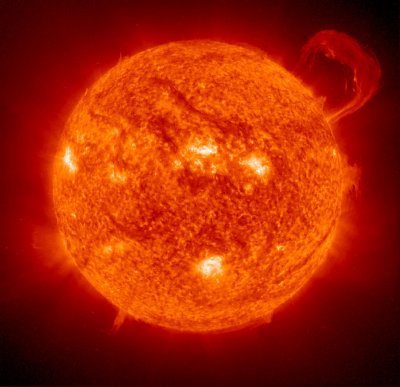Misinterpreting a new study requires there to be a new study in the first place. Though it may seem obvious, this basic truth was evidently lost on the throngs of deniers who pounced on a story about solar variability that appeared on the news aggregator ScienceDaily—on May 12, 2008.
The piece, entitled “Solar Variability: Striking a Balance with Climate Change,” makes the point that, over the course of the Earth’s history, the sun and volcanic eruptions have typically exerted the largest influence on climate change. In recent decades, however, the sun’s influence in particular has been replaced by that of anthropogenic activity—something which Robert Cahalan, a climatologist at NASA’s Goddard Space Flight Center in Greenbelt, Maryland, says “has never happened before.”
Calahan and his colleagues postulate that while solar activity may now be at a minimum (the next solar maximum is expected in 2012, according to the University of Colorado’s Thomas Woods), it could come to play a larger role in affecting climate change in the future.
Now, putting aside the fact that this does not exactly constitute groundbreaking news (as Scholars & Rogues’ Brian Angliss aptly notes), there’s also the small matter that the story was originally published on May 12, 2008—over a year ago. And equally important, this story doesn’t describe a new study; at best, it’s a summary of past and recent research on the sun-climate connection or, as The Phoenix’s David Bernstein put it, a “general interest article” about the subject.
Of course, that didn’t stop Daily Tech’s Michael Andrews from breathlessly reporting only last week that a new NASA study had “concluded that solar variation has made a significant impact on the Earth’s climate.” The multiple errors in Andrews’ post, in turn, did not stop the skeptic blogosphere, including such “luminaries” as Watts Up With That?’s Anthony Watts, from latching onto the “study” and using it to promote their deeply flawed arguments.
It was especially amusing to see some blogs put forth Robert Cahalan as a foil to James Hansen—a NASA scientist willing to blow the whistle on this whole “anthropogenic global warming” malarkey. Never mind the fact that Cahalan himself explains that greenhouse gases have been the “dominant influence on recent climate change” over the last 2 – 3 decades and that, as I mentioned earlier, the “Earth’s climate is now really dominated by human activity, which has never happened before.”
To add insult to injury, the American Thinker blog, in a poor attempt at snark, describes James Hansen as the head of the Goddard Institute for Space Flight—which is interesting, because he is actually the head of the Goddard Institute for Space Studies in New York City. Angliss, who made the catch, quips: “Just a hint, guys—getting your facts this wrong doesn’t do your already nonexistent credibility on this issue any good.” Indeed.
In all seriousness, the notion that solar variations contribute only minimally to recent climate change is well borne out by a large body of research, as Climate Progress’ Joe Romm and others have frequently observed. In a recent post—published (strangely enough) exactly a year after ScienceDaily’s story first appeared—Romm quotes this telling passage from a study published in the journal Geophysical Research Letters:
“Changes in cosmic rays during a solar cycle are two orders of magnitude too small to account for the observed changes in cloud properties; consequently, we conclude that the hypothesized effect is too small to play a significant role in current climate change.”
And the following from a 2007 study published in the journal Proceedings of the Royal Society A:
“There is considerable evidence for solar influence on the Earth’s pre-industrial climate and the Sun may well have been a factor in post-industrial climate change in the first half of the last century. Here we show that over the past 20 years, all the trends in the Sun that could have had an influence on the Earth’s climate have been in the opposite direction to that required to explain the observed rise in global mean temperatures.”
Though I recognize that these wrong-headed arguments are par for the course for deniers, I would at least hope that they get their dates right.
Subscribe to our newsletter
Stay up to date with DeSmog news and alerts






